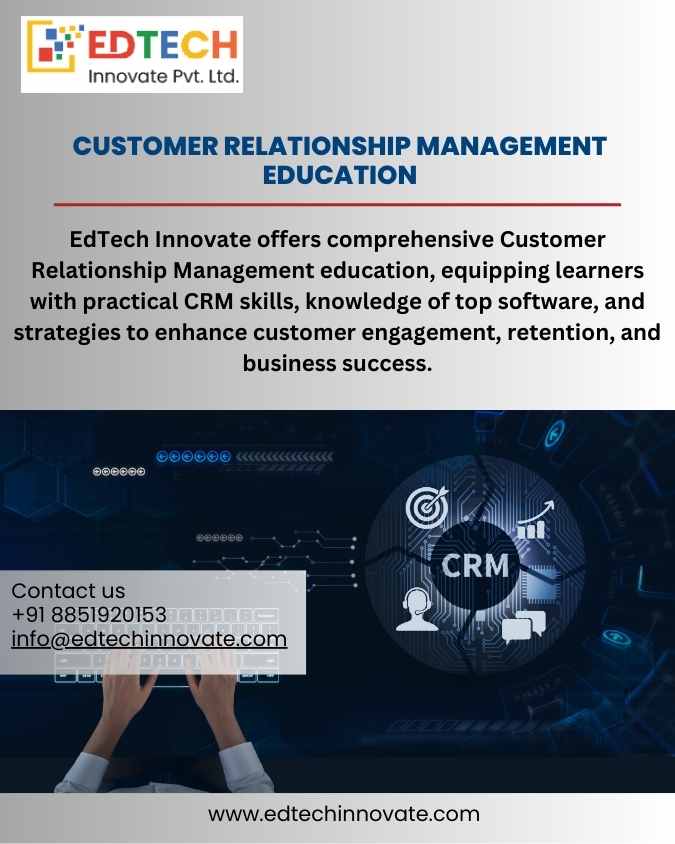Why is CRM regarded as a key component of successful modern business operations?

In today’s customer-centric and digitally evolving business landscape, success hinges not just on selling products or services but on building lasting relationships with customers. Companies that understand, anticipate, and fulfill customer needs outperform competitors in every industry. This is where Customer Relationship Management (CRM) emerges as a game-changer. More than just software, CRM is a comprehensive strategy and technology that empowers businesses to understand their customers deeply, manage interactions effectively, and deliver value consistently.
CRM has become an essential pillar of modern business operations—fueling growth, improving customer retention, and driving profitability. Let’s explore why CRM is considered a key component of business success and how customer relationship management education, CRM tools, and platforms like EdTech Innovate are shaping future-ready professionals.
Understanding Customer Relationship Management
Customer Relationship Management (CRM) refers to the system and process by which businesses manage their interactions with current and potential customers. The primary goal of CRM is to enhance customer satisfaction, streamline processes, increase productivity, and drive sales growth.
CRM systems centralize all customer data—from emails and purchase history to support tickets and feedback—allowing businesses to provide a personalized and efficient customer experience. Whether you’re running a multinational corporation or a small startup, effective CRM ensures that every customer interaction adds value.
Why CRM Matters in Modern Business
In the past, customer data was scattered across spreadsheets, email inboxes, and notebooks. Today, businesses can no longer afford such disorganization. Customers expect prompt responses, personalized service, and a seamless experience across multiple touchpoints—something only a well-implemented CRM can deliver.
Here’s how CRM contributes to business success:
- Improved customer service through quick access to client data and history
- Enhanced sales performance by tracking leads, opportunities, and conversions
- Streamlined communication between sales, marketing, and support teams
- Better decision-making via real-time reports and analytics
- Higher customer retention with timely follow-ups and engagement
CRM isn’t just about managing data—it’s about creating meaningful customer experiences.
Best CRM Software for Business Efficiency
The foundation of any successful CRM strategy lies in choosing the best CRM software that aligns with business needs. Some of the most widely used and trusted CRM platforms include:
- Salesforce – A powerful, customizable CRM for large enterprises with advanced automation and analytics tools.
- HubSpot CRM – Known for its free plan and user-friendly interface, it’s ideal for small to medium-sized businesses.
- Zoho CRM – Offers great value with features like AI-powered sales predictions and omnichannel communication.
- Freshsales (by Freshworks) – Great for startups and growing teams looking for built-in communication tools and AI insights.
- Pipedrive – A sales-focused CRM that emphasizes pipeline management and productivity.
These platforms are packed with CRM software features such as contact management, task automation, deal tracking, sales reporting, and integration with email and marketing tools. Choosing the right CRM software can lead to better efficiency, increased revenue, and enhanced customer satisfaction.
CRM for Small Business: Leveling the Playing Field
One of the most significant advantages of CRM technology today is its accessibility. CRM for small businesses is no longer an expensive or complicated investment. Small enterprises can now harness powerful CRM tools tailored to their specific needs.
CRM helps small businesses:
- Track customer interactions and buying behavior
- Automate routine tasks like follow-ups and invoicing
- Create targeted marketing campaigns
- Personalize customer communication
- Manage contacts and pipelines efficiently
Solutions like HubSpot, Zoho, and Freshsales offer affordable or even free CRM packages that scale as the business grows. With limited staff and resources, CRM acts as a virtual assistant, helping small businesses remain competitive and customer-focused.
Key CRM Software Features to Look For
Selecting a CRM solution involves evaluating the CRM software features that meet your organizational goals. Essential features to look for include:
- Contact Management: A centralized database for customer information
- Sales and Lead Tracking: Monitor the entire sales funnel and conversion rates
- Email and Communication Tools: Integrated communication for better engagement
- Workflow Automation: Reduce manual tasks and save time
- Reporting and Analytics: Gain insights into performance and trends
- Mobile Access: Enable teams to access CRM data from anywhere
- Integration Capabilities: Connect with marketing tools, eCommerce, and customer support software
These features ensure seamless operations, better time management, and improved customer engagement—hallmarks of successful business practices.
Customer Relationship Management Education: A Growing Necessity
As CRM systems become more sophisticated, the demand for skilled professionals who can effectively use these tools is growing. This is where customer relationship management education plays a critical role.
CRM education focuses on:
- Understanding CRM strategies and customer lifecycle
- Training in top CRM platforms like Salesforce, HubSpot, and Zoho
- Developing skills in sales, marketing, and customer analytics
- Learning how to implement and optimize CRM systems
- Exploring data privacy, automation, and integration concepts
By gaining this knowledge, professionals are equipped to lead CRM initiatives, boost customer loyalty, and drive revenue growth in any organization.
The Role of CRM Education Software
To deliver practical and industry-relevant training, modern institutions are using CRM education software. These platforms provide real-time simulations, case studies, and hands-on access to CRM tools, bridging the gap between theory and practice.
CRM education software often includes:
- Simulated dashboards and lead tracking
- Real-time customer case scenarios
- Performance metrics and feedback tools
- Role-based activities to mimic real business environments
Such immersive experiences prepare learners to confidently apply CRM strategies in the workplace.
EdTech Innovate: Empowering CRM Talent
A leader in CRM-focused learning, EdTech Innovate offers cutting-edge programs that blend CRM theory with practical experience. Their CRM courses are designed for students, professionals, and entrepreneurs seeking to gain a competitive edge.
EdTech Innovate provides:
- Certified training in Salesforce, HubSpot, and Zoho CRM
- Expert-led live classes and workshops
- Real-world case studies and projects
- Career support and CRM role readiness
Whether you’re looking to start a career in customer relations, boost your business skills, or enhance your team’s performance, EdTech Innovate equips learners with tools to succeed in the digital economy.
Conclusion
In the age of digital transformation, customers are at the heart of every successful business. Customer Relationship Management is no longer optional—it’s a strategic necessity. From enhancing customer experiences to driving sales and enabling data-driven decisions, CRM has proven to be a key component of modern business operations.
With the rise of CRM for small business, the availability of powerful CRM software features, and access to high-quality customer relationship management education, businesses of all sizes can thrive in a customer-focused world. Institutions like EdTech Innovate are making this knowledge more accessible than ever, shaping the next generation of CRM professionals and business leaders.





